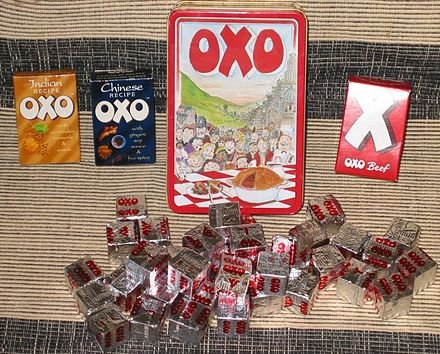British Heritage
Remember, Cherish, Learn.
beta
OXO - the British Beef Bouillon
The Quintessential Culinary Companion of British Heritage.
The rich tapestry of British heritage is enriched by various threads, each representing different aspects of culture, history, and tradition. One such influential thread is the legacy of OXO, the renowned brand of food products that has graced the kitchens of the UK and beyond for over a century. The quintessential culinary companion, OXO's iconic beef bouillon cube, is much more than just a food ingredient. It represents a deep-seated tradition, having left a lasting impact on the British culinary landscape.
The OXO journey commenced in the year 1866, inspired by a German recipe that employed concentrated meat extract. Its formulation was the brainchild of Justus von Liebig, who around 1840, developed a concentrated meat extract. Liebig's Extract of Meat Company (Lemco), established in the United Kingdom, started promoting the original product - a viscous liquid composed only of meat extract and 4% salt.
The nascent OXO product was a luxury commodity due to its high cost. This led the company to embark on a significant research project to create a solid version of the product, making it more affordable and accessible to a broader demographic. The fruition of this endeavor occurred in 1910 when OXO introduced its first cubes, a move that remarkably augmented the brand's popularity.
The company’s commitment to service and nourishment was demonstrated during World War I when OXO provided 100 million cubes, each individually hand-wrapped, to the British armed forces. This initiative significantly bolstered the brand's reputation as a patriotic entity invested in the welfare of its nation.
Throughout the years, OXO's ownership transitioned across multiple corporations, each contributing to the growth and diversification of the brand. The Vestey Group acquired Lemco in 1924, and later merged with Brooke Bond in 1968. Unilever acquired Brooke Bond in 1984 and sold the OXO brand to the Campbell Soup Company in 2001. The brand was finally acquired by Premier Foods in 2006, which maintains its ownership in the United Kingdom.
Internationally, OXO's ownership varies. In South Africa, it is owned by Mars, Incorporated, while in Canada, the brand is under the stewardship of Knorr.
Over the decades, OXO has evolved from a singular product to a range of food ingredients that cater to a variety of tastes and culinary needs. Initially popularized by the original beef stock cube, the company expanded its offerings to include chicken stock cubes, variants with Chinese and Indian spices, herbs, dried gravy, and yeast extract. These cubes can either be used as flavour enhancers in meals and gravies or dissolved in boiling water to produce a bouillon.
From sponsoring the London Olympic Games in 1908 to starting a long-running television advertising campaign titled "Life with Katie" in 1958, OXO has always been a dynamic and innovative presence in the market. It skillfully leveraged various channels of marketing, such as recipe suggestions, gifts, and sponsorships, seamlessly integrating into the fabric of English life.
OXO’s advertising history has been characterized by its creative and heartwarming campaigns. The campaign featuring the "Oxo Family," which aired from 1983 until 1999, was a particular cultural landmark. The campaign concluded with the symbolic moment of the family moving out of the house, encapsulating the passage of time and the evolution of the brand alongside its loyal customers.
A poignant moment in OXO's history occurred in 2014 when the company aired a 1984 Oxo advert on Christmas Day in memory of actress Lynda Bellingham, who had recently passed away from colon cancer.
OXO's legacy goes far beyond its tangible product offerings. Its contribution to British heritage is multifaceted, influencing not just the culinary landscape, but also the social and cultural fabric of the nation. OXO has been a culinary staple in many households, a symbol of wholesome, home-cooked meals that unite families around the dinner table. The brand's memorable marketing campaigns and advertising strategies have found their way into the collective British consciousness, creating a strong cultural association that has endured through the decades.
Through its history, product diversification, and marketing initiatives, OXO has made significant contributions to British heritage, firmly cementing its position as an iconic brand deeply intertwined with the UK's gastronomic traditions and cultural history. As such, the story of OXO is a testament to the power of food as a cultural artefact, a connector of communities, and an emblem of shared heritage.
The OXO Odyssey: A Brief History
The OXO journey commenced in the year 1866, inspired by a German recipe that employed concentrated meat extract. Its formulation was the brainchild of Justus von Liebig, who around 1840, developed a concentrated meat extract. Liebig's Extract of Meat Company (Lemco), established in the United Kingdom, started promoting the original product - a viscous liquid composed only of meat extract and 4% salt.
The nascent OXO product was a luxury commodity due to its high cost. This led the company to embark on a significant research project to create a solid version of the product, making it more affordable and accessible to a broader demographic. The fruition of this endeavor occurred in 1910 when OXO introduced its first cubes, a move that remarkably augmented the brand's popularity.
The company’s commitment to service and nourishment was demonstrated during World War I when OXO provided 100 million cubes, each individually hand-wrapped, to the British armed forces. This initiative significantly bolstered the brand's reputation as a patriotic entity invested in the welfare of its nation.
Throughout the years, OXO's ownership transitioned across multiple corporations, each contributing to the growth and diversification of the brand. The Vestey Group acquired Lemco in 1924, and later merged with Brooke Bond in 1968. Unilever acquired Brooke Bond in 1984 and sold the OXO brand to the Campbell Soup Company in 2001. The brand was finally acquired by Premier Foods in 2006, which maintains its ownership in the United Kingdom.
Internationally, OXO's ownership varies. In South Africa, it is owned by Mars, Incorporated, while in Canada, the brand is under the stewardship of Knorr.
Product Diversification: Beyond the Cube
Over the decades, OXO has evolved from a singular product to a range of food ingredients that cater to a variety of tastes and culinary needs. Initially popularized by the original beef stock cube, the company expanded its offerings to include chicken stock cubes, variants with Chinese and Indian spices, herbs, dried gravy, and yeast extract. These cubes can either be used as flavour enhancers in meals and gravies or dissolved in boiling water to produce a bouillon.
Impacting British Life: Marketing and Advertising
From sponsoring the London Olympic Games in 1908 to starting a long-running television advertising campaign titled "Life with Katie" in 1958, OXO has always been a dynamic and innovative presence in the market. It skillfully leveraged various channels of marketing, such as recipe suggestions, gifts, and sponsorships, seamlessly integrating into the fabric of English life.
OXO’s advertising history has been characterized by its creative and heartwarming campaigns. The campaign featuring the "Oxo Family," which aired from 1983 until 1999, was a particular cultural landmark. The campaign concluded with the symbolic moment of the family moving out of the house, encapsulating the passage of time and the evolution of the brand alongside its loyal customers.
A poignant moment in OXO's history occurred in 2014 when the company aired a 1984 Oxo advert on Christmas Day in memory of actress Lynda Bellingham, who had recently passed away from colon cancer.
Legacy and Contributions to British Heritage
OXO's legacy goes far beyond its tangible product offerings. Its contribution to British heritage is multifaceted, influencing not just the culinary landscape, but also the social and cultural fabric of the nation. OXO has been a culinary staple in many households, a symbol of wholesome, home-cooked meals that unite families around the dinner table. The brand's memorable marketing campaigns and advertising strategies have found their way into the collective British consciousness, creating a strong cultural association that has endured through the decades.
Through its history, product diversification, and marketing initiatives, OXO has made significant contributions to British heritage, firmly cementing its position as an iconic brand deeply intertwined with the UK's gastronomic traditions and cultural history. As such, the story of OXO is a testament to the power of food as a cultural artefact, a connector of communities, and an emblem of shared heritage.
- Oxo (food)en.wikipedia.org






